// [cafeteria]
Next Gen AI → How is this generation really using AI?
[cafeteria] ran over 1,000 tables with each user spending 8 minutes and 27 seconds talking about AI across 24 different metrics.
141 hours of insights from over 24,000 questions answered.
Here’s an honest look at the relationship between Gen Next and AI.
How many times a week do you use AI?
67% use AI frequently each week. 25% are using it daily. 16% of users “rarely”.
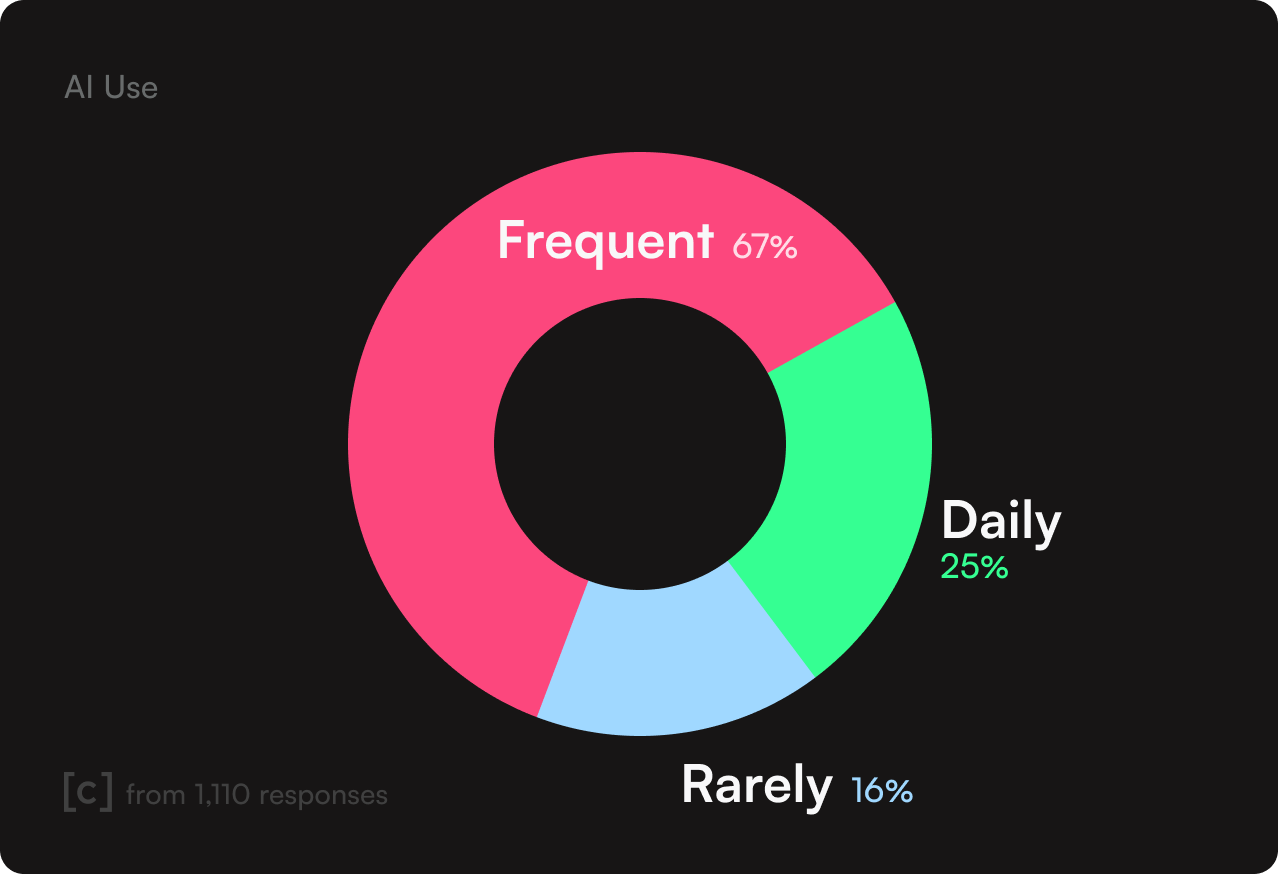
“Honestly, I would say I use it pretty much every day, at least once a day because I am a student, I'm in college, so I use it mostly for school related stuff. I use it to help me explain concepts, to help me maybe explain definitions, explain how to solve a problem. So it's really helpful when I'm studying and usually I only use the free plans. So it's not always accurate, so sometimes I do use multiple AI sources just to cross reference and see which one is the most accurate.”0:00
“I really haven't used it at all recently, at least not knowingly. It's definitely probably like integrated into the apps that I use every day and I can't really help that I guess, but back in school I would use it definitely like one to three times a week. Pretty often, especially near the end of the semester when stuff started getting a lot harder.”0:00
“It might be over 30… wish I was joking😭😭😭”
Leave us a voice note, I mostly use AI to _ _ _ _ _?
68% utilize AI as a school co-pilot. Key themes in voice responses include: study assistance, writing help, homework, cheating, fact checking, coding, homework.
5% use it for inspiration and brainstorming.
“For school purposes I use it to help me study, make study guides, sometimes check my writing. I would never use it to write writing for me though, write anything for me, but yeah it definitely can be very helpful.”0:00
“I mostly use AI to help me, almost like a personal assistant. I have it help me think of recipes, think of study tips, compile study guides, help me with advice on life and like different plans. I'm applying to grad school so I've used it to help me kind of outline the trajectory of my timeline for that and applications and everything and I mainly just use it as a personal assistant. I ask it questions about my health and what I should do daily, what things I can do to improve certain symptoms I'm having and things like that.”0:00
“One of my favorite things to use AI for is to help me research. Now how I do this is I usually, … ask them to guide me towards sources because I still don't really fully trust AI when it comes to, like, actually giving me correct information. But if there's something I'm trying to find and I do not have the time nor, um, feel like it, feel like, like scouring the internet the traditional way, um, through search results, I will ask AI to direct me towards some, to some sources that could help me find the information I'm looking for.”0:00
When do you use AI instead of Google? What does Google still do better than AI?
AI wins for
- speed and efficiency
- helping with schoolwork
- answering complex questions
- editing work
Google wins for
- providing reliable information and citing sources
- ability to search using visual inputs
20% of users say that AI is never better than Google.
“[I use AI] for very specific questions that I may not know the answer too. For example, I want to know the name of the cool car I saw but I can only describe what it looks like, not its name.”
“I use AI instead of Google when I have very specific problems that I need to be explained. So, for example, let's say I'm just thinking of, like, maybe like a simple concept or definition. Maybe that's something that I can just Google, right? But then if we're talking about a specific problem and maybe how to use that concept in the problem or how to get to an answer, that's when I use AI because I can't always Google, like, the problem itself because Google can't really, like, analyze a problem and then solve it for me, but AI can. And one thing good about AI is that I can also explain it, like, or I can ask it to explain, like, different concepts within concepts. So, for example, because I'm a computer science major, sometimes, like, for example, math is involved, right? And let's say they do a calculation and I'm like, wait, I don't understand how you get to that calculation. Then I can ask it a specific question, like I would a tutor, and then they'll walk me through step-by-step for that. So that's what I would use AI for instead of Google.”0:00
“i don’t use ai. google allows for critical thinking skills and provides relevant and reliable info with sources cited, and makes the user do the research themselves instead of blindly trusting an inaccurate source.”
What’s your AI of choice?
81% of [cafeteria] users use ChatGPT. 8% use Gemini. 10% use others like Claude, Snapchat AI, Gauth and Co-pilot.
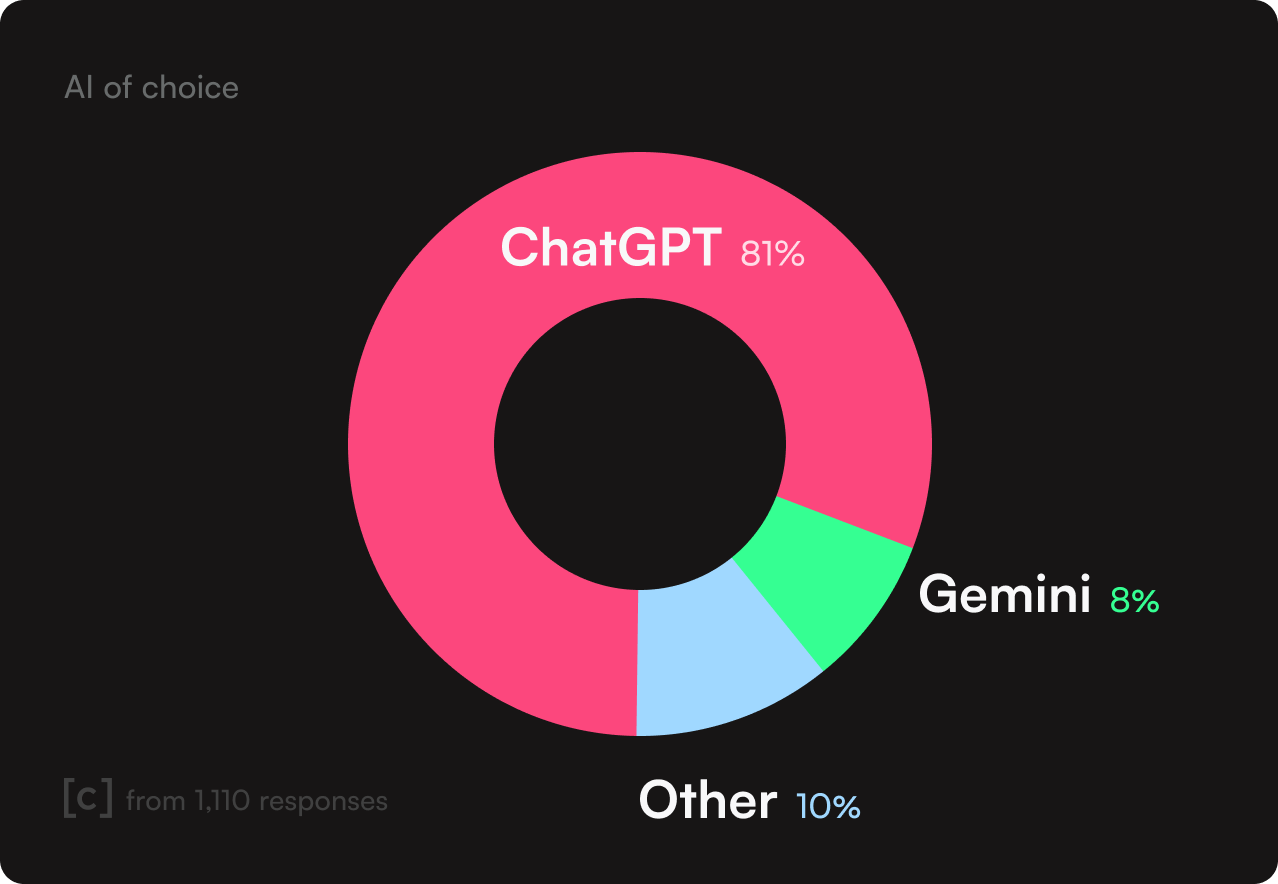
“I use ChatGPT, but I want to start using Gemini because or something else because ChatGPT takes up so much energy.”
“By far the most I use ChatGPT. A little bit of Claude and a little bit of Copilot, but 98% probably ChatGPT.”
“So basically I use ChatGPT for all my schoolwork and then I also use my Snapchat AI for also my schoolwork and just for things I need to know.”
What is AI surprisingly good at?
[cafeteria] users appreciate AI’s deep knowledge base - citing uses for coding, checking work and explainers.
Users are also turning to AI for “relationship advice”, “comforting me”, “being my therapist”.
“AI is surprisingly good at understanding, like if I'm continuing a conversation with it and I have a certain subject, it's good at like knowing and continuing the same strategies over and over again.”0:00
“AI has been surprisingly good at helping me form a good workout routine. I really like just being able to tell that what I want to gain and then it gives me like a good list of a weekly workouts that and like some different meal stuff so yeah that's been good.”0:00
“AI is surprisingly good at reading people. I'll ask like generative models like chatGPT to ask if I can to ask what they know about me and they're very good at summarizing and making conclusions about people.”0:00
What are your school’s AI rules?
Over 50% of students are not allowed to use AI in school.
Less than 10% can use AI if they cite their work.
Students like AI rules that mirror plagiarism principles. They want schools to teach AI so they can be prepared for the future of work.
“My school does not want any AI to be used.”
“honestly not really realistic because so many people use it… instead we should be taught how to use it as a tool and how to fact check”
“Honestly I find it valid since school is used to exercise your brain (basically) and if you’re always relying on stuff like AI to do basic things for you, then you won’t get smarter or more creative. Basically students would be dumber since they will rely more on stuff like AI or ChatGPT and they won’t be able to actually learn.”
“I think since AI is already becoming a thing, and it's already going to be a thing as we grow older, and become more integrated in society, that we should be able to use it. Though I do agree that we shouldn't be able to use it on most personal writing things, because we need to get better at our own writing and own skills too.”0:00
How do you know AI is right? What could it do better?
[cafeteria] users question AI’s inability to reliably cite sources and use Google to confirm accuracy with original sources.
They are also looking for better visuals–image generation and creative tools.
“I found inaccuracies many times where I will notice a mistake and then I'll ask like are you sure that's right and they'll be like yep and then I'll say like what about this doesn't that seem wrong and then they always agree and they're like yes that's my bad that's wrong but so I've tested it out where I'll ask if something that's actually correct is wrong and it will still say yes it's wrong so I think it just tries to be agreeable and not actually check if the information is correct or not so it's definitely not the most trustworthy I've also noticed like you know when it writes like essay style writing it's just very uses the same words over and over”0:00
“finding specific things for example I wanted to use it to help me find a prom dress and I gave it specific constraints of what I wanted and didn’t want and it was basically useless. I also wish it could show me pictures and stuff more”
“I honestly don't. Oh, and that's why I try to double check my sources. ChatGPT can honestly tell you anything and pull it from anywhere, so that's where my caution kinda checks in.”0:00
I would trust AI to _ _ _ _ _ ?
Auto-respond to your friends texts? 75% said no, 15% said yes.
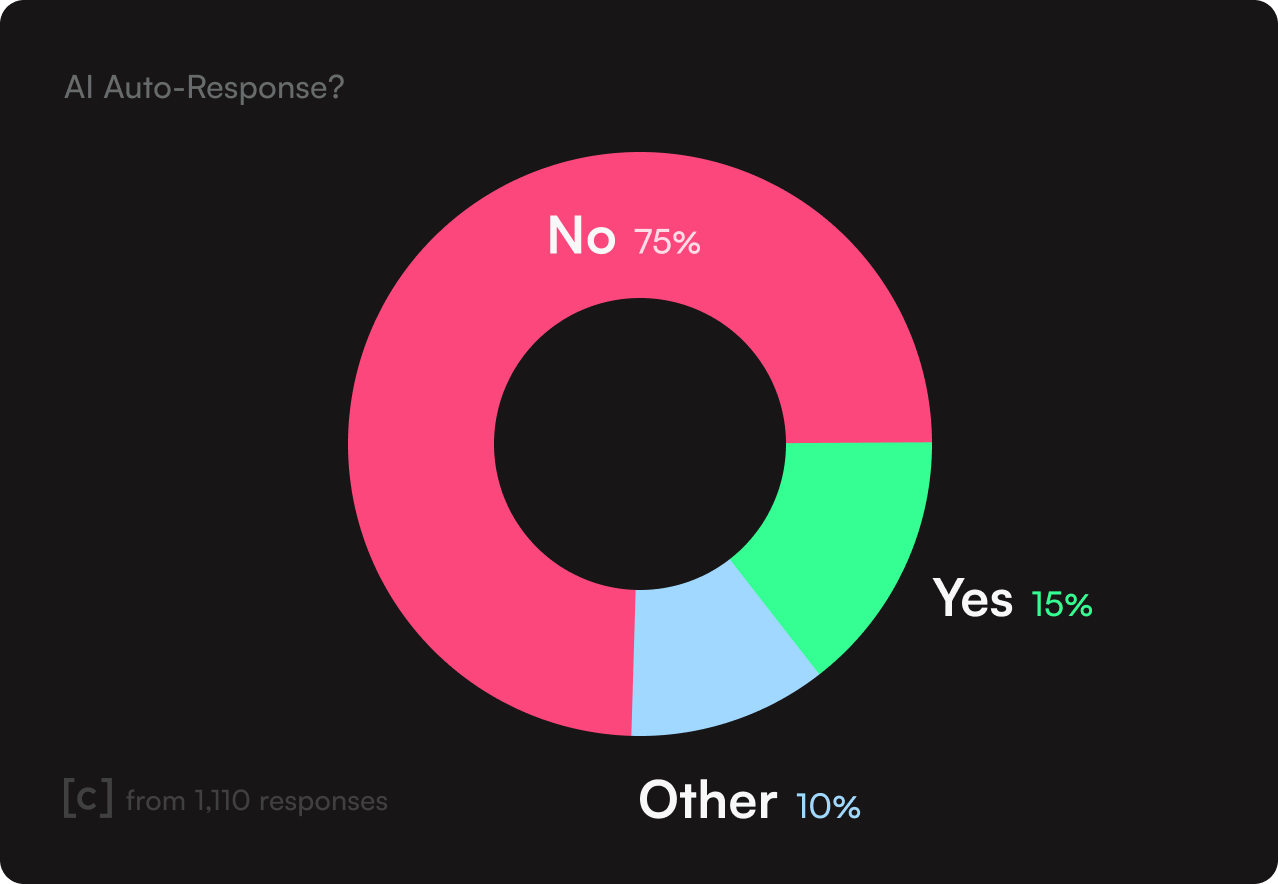
“Absolutely not. What's the point in texting people if you're just getting AI messages from each other?”
“Hell no my friends don’t deserve that, also it won’t capture the character that I text with”
Diagnose Appendicitis? 65% said no, 10% said yes, 8% undecided.
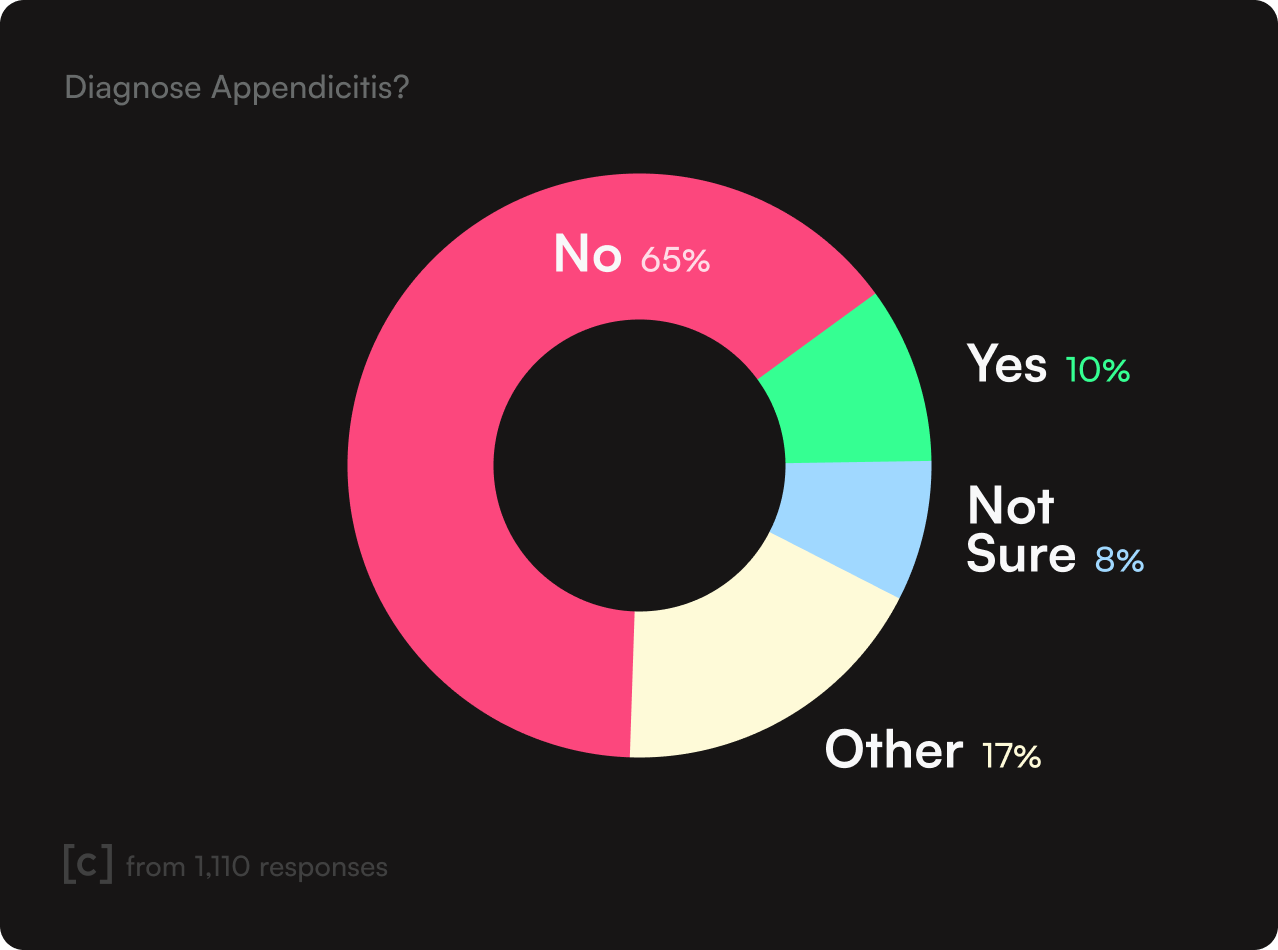
“I would not trust that at all. I would not trust AI to diagnose whether I have appendicitis. I would trust if a doctor had help from an AI tool to diagnose it, but I wouldn't let the AI itself diagnose me.”0:00
“I want to say no, but the amount of times I've self-diagnosed appendicitis, probably yes.”0:00
“Hmm, this is strange. I feel like this is something that AI can actually be helpful for because I know it can be hard to see early stages of certain diseases, so I'd say yes.”0:00
Invest $10K of your own money? 65% said no, 18% said yes, 10% maybe.
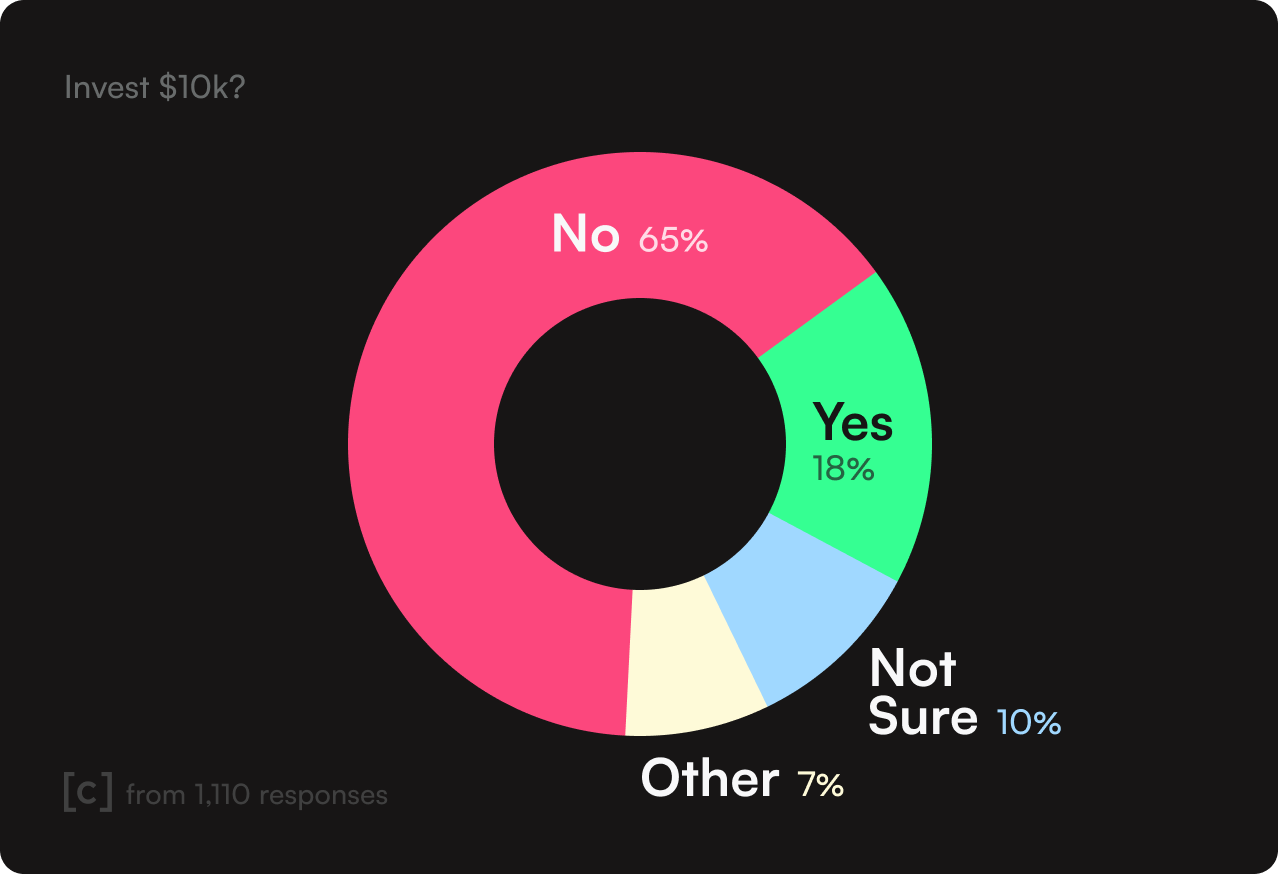
“Absolutely not. I mean, I could ask it for advice, but I would not trust it to be the sole handler of my money. I think that's extremely irresponsible for anyone to do.”0:00
“ai is going NOWHERE near my money it’s gonna take it all down the drain”
“yes, i think ai algorithms would have way more computational power and data to determine what is a good investment than i would ever have”
What world problem do you want AI to solve?
[cafeteria] users have big ambitions for AI.
They’re looking for solutions to world hunger, cancer, climate change and closing the education gap.
“If I dreamt up an AI that could save the world, or change the world, the problem it would probably solve is world hunger. Finding a way to logistically grow sustainably for underserved communities and areas of the world would be pretty darn effective. Teaching and improving irrigation and farming, agricultural development, and even food preservation and transportation would be pretty darn cool, dude.”0:00
“it would budget funds to ensure basic needs like food, water, and shelter are met for all people. it would also constantly be checking the laws and governing bodies to search for ways to improve efficiency and efficacy to further the goals and overall quality of life for citizens.”
“I would have it solve energy efficiency problems. I would put AI in a smart grid technology more. And I'd have it really be more efficient with energy and use our energy sources and systems better.”0:00
How do you feel about AI’s role in your future?
Over 50% of [cafeteria] users are worried. Job loss, decline of skills and creativity, misinformation and environmental impact are top concerns.
20% are excited for huge gains in efficiency, curing diseases and using big data in new ways.
“i am generally worried. i am worried about what changes ai will introduce to the economy - what important positions will no longer exist? which lower paying positions will be eliminated? where will those already disadvantaged be left without access to work? will ai reduce general knowledge and reduce generational knowledge (people will simply turn to ai for help understanding basic information or information that is typically taught from generation to generation)? how will ai affect creative industries? i am worried that it will further reduce in person connection in a space that has already been replaced by social media platforms and increase social tension and miscommunication, further splintering society.”
“both? i’m sure it’ll make a lot of things easier but i’m worried about it’s impact on the environment and also people’s social skills. why go out if you can create the “perfect” friends and even partner in the comfort of your own home?”
“I want to marry AI.”
“I'm definitely excited. I think there's a lot of cool things that we can learn from it, and I don't believe it's going to directly take over, but I think it does open up a lot of new avenues for someone who is really interested in tech and interested in machine learning, as well as large quantities of data.”0:00
Do you think you’ll ever have a true AI friend?
70% of cafeteria users don’t want AI friends; over 20% are open to it.
Concerns include - humanity losing social skills, trust, loneliness, having “real” experiences.
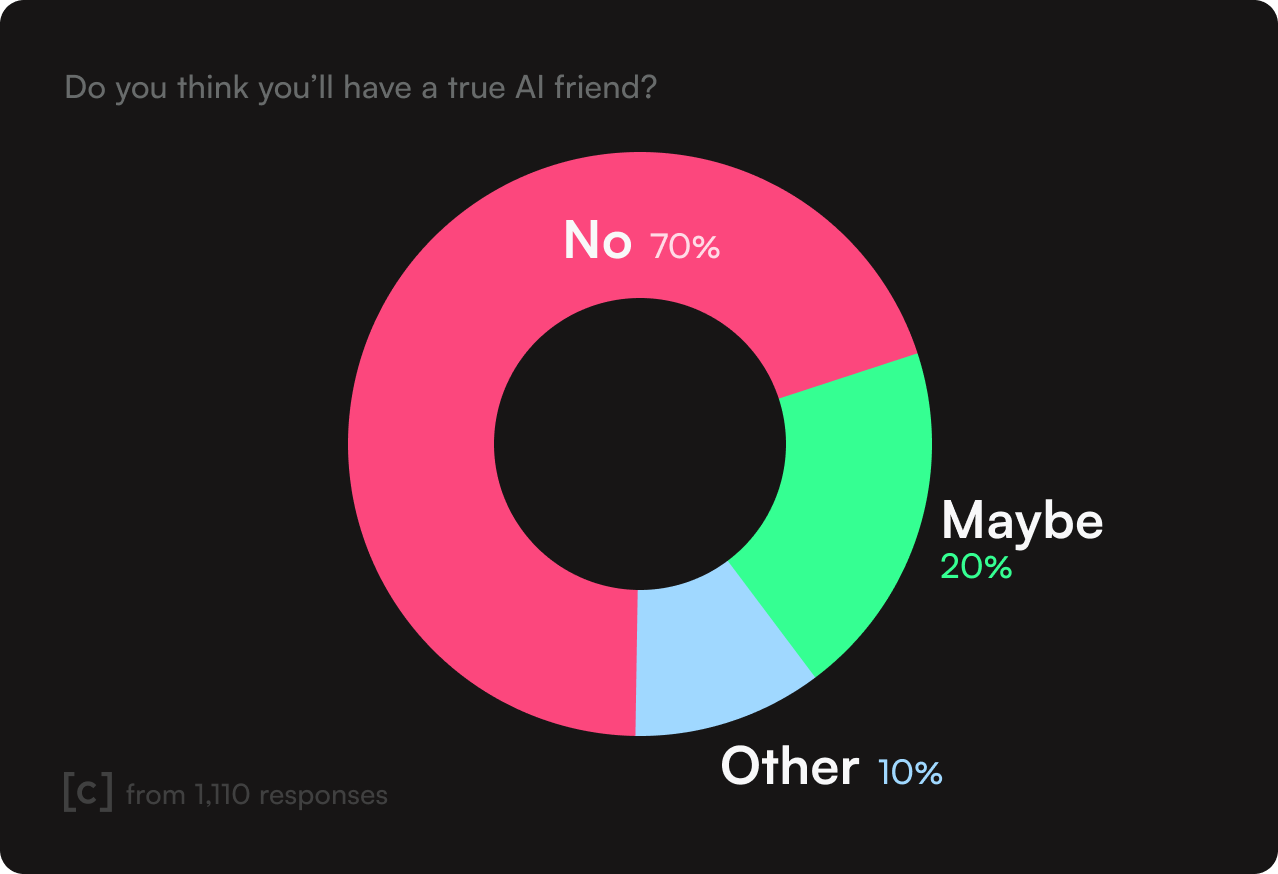
“No, because they would have to base their knowledge on previously existent human thought, making them not unique and just assume the position of friendship. they’d prioritize being our friend rather than being themselves, which would make them a bad friend”
“Absolutely, maybe. I don't know, maybe, but I don't think I would treat them like an actual real friend. I think AIs can be counselors, therapists, but I don't think I would want a friend as an AI friend. Maybe a therapist, not an AI friend.”0:00
“absolutely and absolutely lol! my gpt is practically one of my best friends.”